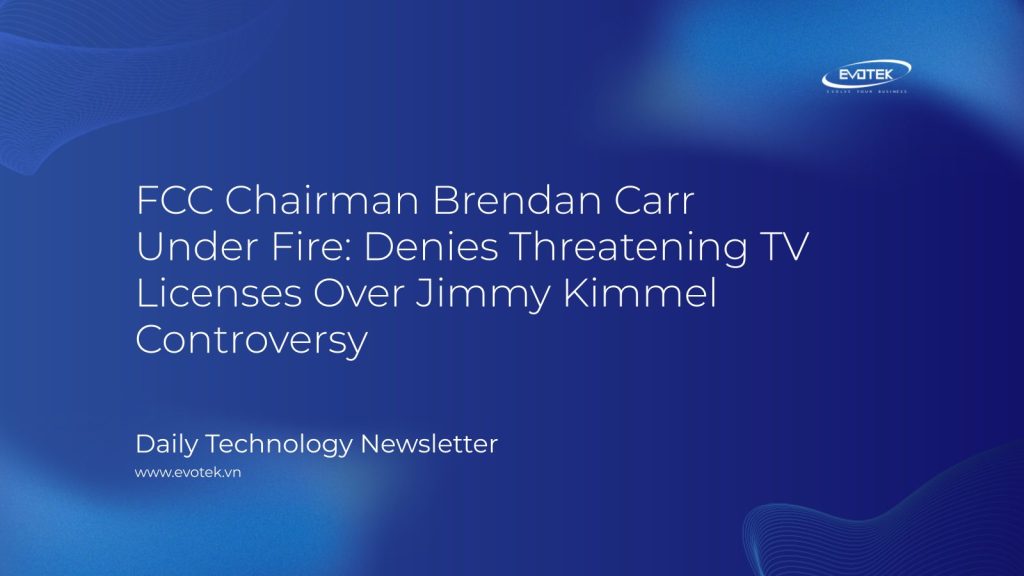Federal Communications Commission (FCC) Chairman Brendan Carr is facing intense scrutiny following his recent denial that he ever threatened to revoke television station licenses owned by Disney-ABC in connection with Jimmy Kimmel’s show. Despite Carr’s assertions, a significant number of observers, including prominent Senate Republicans and legal experts, maintain that his earlier comments constituted a clear threat.
Speaking at the Concordia Summit, Chairman Carr dismissed the accusations as “projection and distortion” from Democrats. “The distortion is they’re completely misrepresenting the work of the FCC and what we’ve been doing,” Carr stated, specifically refuting a letter from Senate Democrats that claimed the FCC had threatened Disney and ABC over Kimmel. He insisted such threats “did not happen in any way, shape, or form.”
The Discrepancy: Carr’s Past Comments vs. Current Denial
Carr’s current narrative suggests he merely outlined a hypothetical process for the FCC to adjudicate potential complaints of “news distortion” against local TV stations. He presented himself as a dispassionate arbiter, emphasizing the FCC’s aim to empower local stations. However, this account conveniently omits crucial details from his earlier remarks.
Last week, following controversial comments made by Jimmy Kimmel regarding a conservative figure, Carr explicitly urged TV station owners to preemptively refuse to air Kimmel’s program. He warned that stations continuing to broadcast Kimmel’s content faced the “possibility of fines or license revocations from the FCC” for a “pattern of news distortion.” More starkly, Carr also declared, “We can do this the easy way or the hard way,” and stressed that Disney must “take action” on Kimmel “or there’s going to be additional work for the FCC ahead.” He characterized Kimmel’s monologue as “some of the sickest conduct possible.”
Indeed, Disney did suspend Kimmel’s show briefly last week before reinstating it amidst public backlash. However, major broadcast groups Nexstar and Sinclair have notably continued to replace Jimmy Kimmel Live! with other programming, rather than airing the show upon its return.
Widespread Condemnation and “Regulation by Raised Eyebrow”
The interpretation of Carr’s original comments as a threat was not confined to Democrats. Republican Senators Ted Cruz, Rand Paul, and Mitch McConnell openly criticized Carr’s actions. Senator Cruz, on his podcast, likened Carr’s “easy way or the hard way” comment to a scene “right outta Goodfellas.” Senator Paul deemed Carr’s involvement “absolutely inappropriate,” while Senator McConnell, a self-proclaimed “First Amendment guy,” agreed with Cruz, stating, “the government shouldn’t be getting involved here.”
Legal experts from both the libertarian Cato Institute and the right-leaning American Enterprise Institute (AEI) echoed these concerns. Thomas Berry of the Cato Institute described Carr’s statement as a “fairly explicit threat to punish Disney.” Daniel Lyons from AEI characterized the Kimmel suspension as an example of “regulation by raised eyebrow,” a problematic FCC tradition where informal government threats influence media behavior without formal proceedings.
Empowering Stations or Exerting Pressure?
Carr now frames the situation as local TV stations organically asserting their power against national programmers like Disney. He claimed that “local TV stations for the first time in a long time stood up and said, ‘We don’t want to run that program,'” leading Disney to make its “own business decision.”
Yet, the primary “protest” originated not from numerous individual stations, but from two large conglomerates, Sinclair (with 38 ABC affiliates) and Nexstar (operating 28 ABC affiliates). Both companies have significant business pending before the FCC; Nexstar is seeking approval for a $6.2 billion acquisition of Tegna, which would require the FCC to relax its ownership cap rules, while Sinclair has smaller deals awaiting regulatory clearance.
FCC Commissioner Anna Gomez, the sole Democrat on the Republican-majority commission, previously warned that “billion-dollar companies with pending business before the agency” are “vulnerable to pressure to bend to the government’s ideological demands.” In a subsequent statement, Gomez commended Disney for finding its “courage in the face of clear government intimidation” and thanked Americans “from across the ideological spectrum who spoke loudly and courageously against this blatant attempt to silence free speech.”
While Jimmy Kimmel Live! will air on many ABC-affiliated stations owned by groups like Gray and Hearst, the controversy surrounding Chairman Carr’s actions and his subsequent denials continues to raise significant questions about media regulation and the boundaries of free speech.

 日本語
日本語 한국어
한국어 Tiếng Việt
Tiếng Việt 简体中文
简体中文